Search the Special Collections and Archives Portal
Search Results
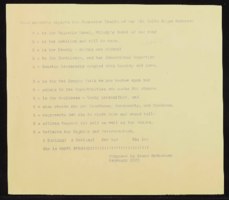
Phi Delta Kappa sorority records
Date
Archival Collection
Description
Folder of materials from the Mabel Hoggard Papers (MS-00565) -- Civic engagement file. National Sorority of Phi Delta Kappa certificate, journal, meeting minutes, program, and poem.
Mixed Content
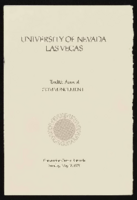
University of Nevada, Las Vegas (UNLV) 12th commencement program
Date
Archival Collection
Description
Commencement program from University of Nevada, Las Vegas Commencement Programs and Graduation Lists (UA-00115).
Text
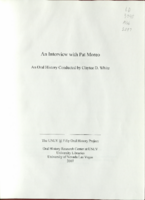
Transcript of interview with Pat Moreo by Claytee D. White, September 13, 2007
Date
Archival Collection
Description
Text
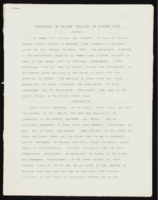
"Stereotypes of Mexicans Projected in Selected Film": manuscript draft by Roosevelt Fitzgerald
Date
Archival Collection
Description
From the Roosevelt Fitzgerald Professional Papers (MS-01082) -- Unpublished manuscripts file.
Text

Transcript of interview with Patricia Becker by Claytee D. White, April 15, 2014
Date
Archival Collection
Description
Patty Becker’s recollections concerning her law career shows her determination and enthusiasm in encouraging women to enter the field. Beginning during a period when few women were accepted to study law, she not only passed the Nevada Bar with high marks but was chosen by Governor O’Callaghan in 1979 to become deputy attorney general. In 1985 she was chosen by Governor Richard Bryan to be the first and only woman selected to serve on Nevada’s Gaming Control Board. She also recollects arguing before the Nevada Supreme Court the case that put Tony Spilotro in the Nevada’s Black Book and working with many proficient attorneys like Oscar Goodman, Patty left the Nevada Gaming Control Board to become general counsel for Hurrah’s Entertainment where she served for nine years and then began Chief of Staff for Governor Bob Miller from 1993 through 1995. Patty also served as senior Vice President of corporate affairs and legal adviser for Aladdin Gaming as well as sitting on several corporate boards. Patty began Patricia Becker and Associates and continues to serve on the board of Fitzgerald’s Hotel and Casino, serves her own clients, as well as teaching at the University of Nevada, Las Vegas, in gaming. She encourages women to enter gaming, keep a sense of humor and not to be afraid to speak up for themselves. Meanwhile she challenges herself intellectually and believes that one should always continue to grow personally and professionally.
Text

Transcript of interview with Lestor Burgwardt by Connie Carr, February 9, 1980
Date
Archival Collection
Description
On February 9, 1980 collector Connie Carr interviewed teacher, Lestor Burgwardt (born May 24, 1926 in Hamburg, New York) in his home in Las Vegas, Nevada. This interview covers local entertainment, Lake Mead, school districts, and gaming’s effect on the educational system. Lestor also recalls his move to Nevada and offers a general overview of Henderson in 1954.
Text

Transcript of interview with Edwina E. Danzienger by Leanne Terry, February 26 & 29, 1980
Date
Archival Collection
Description
On February 26 and 29 of 1980, Leanne Terry interviewed Edwina E. Danzinger (born 1925 in Houston, Texas) about her life in Southern Nevada. Danzinger first talks about her family, specifically her siblings, children, and grandchildren. She also talks about church membership, early housing in Nevada, her husband’s work on the Nevada Test Site, and her family’s hunting practices. Danzinger then describes her involvement in Boy Scouts and hiking, her various positions of employment at the University of Nevada, Las Vegas, how the college campus has changed over time, and how the college students have changed over the years. The two also talk about the changes in the crime rate, the atomic testing, air pollution, and the changes made to the university by the Buckley Amendment.
Text
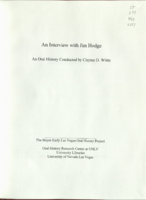
Transcript of interview with Jim Hodge by Claytee White, April 13, 2009
Date
Archival Collection
Description
Jim Hodge describes an active and success filled life in this narrative. Born and raised in the South, Jim enlisted in the Navy at the young age of 17, just as World War II was winding down. His primary job was that of a cook. He became smitten with the life of an entertainer after participating in a play and headed for Hollywood in 1952. It was there that he auditioned for Donn Arden, who organized and directed Las Vegas shows. Though he didn't get the part, he did get hired to be a singer for a show featuring Betty Grable. Thus his career was launched and would span the heyday of Las Vegas entertainment from the 1950s to the 1970s. Jim talks about the people, shows and places that touched his life. He also offers thoughts about the changes in the Vegas entertainment scene as well as shares his relationship with his church over the past 40 years.
Text
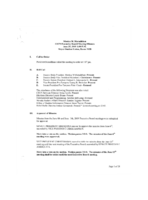
Meeting minutes for Consolidated Student Senate, University of Nevada, Las Vegas, June 27, 2003
Date
Archival Collection
Description
Text

Interview with Edward Bonfoy Giller, April 5, 2005
Date
Archival Collection
Description
Text
